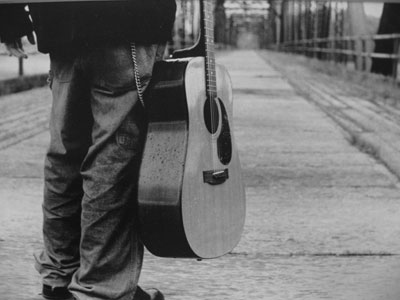All Nonfiction
- Bullying
- Books
- Academic
- Author Interviews
- Celebrity interviews
- College Articles
- College Essays
- Educator of the Year
- Heroes
- Interviews
- Memoir
- Personal Experience
- Sports
- Travel & Culture
All Opinions
- Bullying
- Current Events / Politics
- Discrimination
- Drugs / Alcohol / Smoking
- Entertainment / Celebrities
- Environment
- Love / Relationships
- Movies / Music / TV
- Pop Culture / Trends
- School / College
- Social Issues / Civics
- Spirituality / Religion
- Sports / Hobbies
All Hot Topics
- Bullying
- Community Service
- Environment
- Health
- Letters to the Editor
- Pride & Prejudice
- What Matters
- Back
Summer Guide
- Program Links
- Program Reviews
- Back
College Guide
- College Links
- College Reviews
- College Essays
- College Articles
- Back
On War and Guitars
My grandfather carried the guitar with him everywhere he went. It was an old, old guitar, older than my father and I combined. The paint had chipped off in places, revealing the raw and naked color of the original wood, and the remaining paint resembled mysterious islands and countries of the world. The case was battered and ugly, stickers from decades ago peeling off and faded. The strings on the guitar had rusted and it was missing a single string.
It was the single string that my grandfather told the story of, everywhere he went. His audience ranged from barely walking toddlers to seniors as old as him. He always began with these words, “I have lived a great and terrible life.”
He would proceed to take out his guitar, the battered, missing-stringed guitar and take two tentative strokes before continuing. “This guitar is an ancient one. So old it has seen the world explode in Hiroshima, so old that it makes George Bush seem like a youngster.” He pauses and takes off his glasses. Wiping them on his shirt, he continues, “When I fought in World War II, I took this guitar with me. The world was a dark place then—the only colors that ever appeared were red of blood and fire and black, of the ashes spew.
“But this guitar, it brought another color. For my fellow soldiers, I played every night, and we forgot about the dying world. Just for a few minutes, if we were lucky, an hour at most, but this music helped us forget the world of people dying mercilessly.” He sighs and touches the guitar fondly.
“Escape from reality, however, is virtually impossible, so it turns out. We were always slammed back into the real world, and we were sent off to fight. And more people died. And we killed even more. One day, we were marching, the soldiers and I to a different camp with all our belongings, and we came across a helpless lady. She was sandwiched in between two slabs of concrete, and we all knew she was done for. She knew herself too. She asked us to stay with her because she was afraid of dying alone. All her life, she’d been alone, she told us, and she didn’t want to be alone when she died. We sat by her side until James, one of the soldiers, nudged me and told me to play for her. We sat under the darkness and I sang and played for her until my voice was sore. Then, the others started singing for me, while I pounded away on my guitar. Until a string snapped in half.
“It was strange, like a strange echo, when the string snapped. Then there was silence, and a bloody cough. ‘Thank you,’ she whispered. She leaned over and touched the broken string of my guitar. ‘Thank you,’ she said again, and the color drained from her eyes and her arms fell limp. We all got up, and we kissed her forehead, one at a time. And when it was my turn, I tore the string from the guitar and put it with her hair. I said, ‘Thank you. Thank you too.’
I never replaced the string of this guitar. Because it reminded us all of war, the horror, the ugliness. I kept it as a reminder to myself, and all of us.” He would pack away his guitar right then, and turn away from the audience. He didn’t want anyone to see him cry.
But we all knew. We all knew.
A few days ago, my grandfather passed away. He gave me his guitar and with a croak of his dying breath, he told me to continue his legacy. And so this guitar sits with me on my lap as I sit on the rickety subway of New York. My eyes are still crusted with tears when a young lady flops into a seat beside me. “Handkerchief?” she asks me, waving a white sheet of cloth in front of my face. I gratefully take it while she stares at the guitar case.
“That,” I say, patting the case, “was my grandfather’s.”
“It’s beautiful,” she says.
“Yes, it is. He lived a great and terrible life, you know…”

Similar Articles
JOIN THE DISCUSSION
This article has 0 comments.
